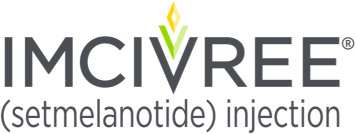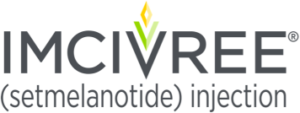POMC, PCSK1, and LEPR deficiencies are rare genetic disorders that impair the normal function of the melanocortin-4 receptor (MC4R) pathway, crucial for regulating hunger and energy balance. Mutations in these genes lead to abnormal signaling in this pathway, resulting in severe early-onset obesity and an insatiable appetite. These conditions are characterized by their resistance to typical obesity treatments, making specific therapies like Imcivree (setmelanotide) necessary to manage symptoms effectively by targeting the underlying genetic abnormalities.

The POMC/PCSK1/LEPR CDx Panel is a next generation sequencing (NGS)-based in vitro diagnostic test that analyzes genomic DNA isolated from blood or saliva. Specimens used with the test are K2EDTA blood collected using certain indicated K2EDTA blood collection devices and saliva collected using ORAcollect-Dx™ OCD 100 devices. The test detects germline nucleotide substitutions, short insertions and deletions, and copy number variants (CNVs) within the following 3 genes:
The test is a companion diagnostic device intended to select adult and pediatric patients 6 years of age and older who have obesity and certain variants in POMC, PCSK1, or LEPR genes for treatment with IMCIVREE® (setmelanotide) in accordance with the approved therapeutic product labeling. The POMC/PCSK1/LEPR CDx Panel is a single-site assay performed at PreventionGenetics, LLC (Marshfield, WI).
What is the Program?
This test is a companion diagnostic device intended to select adult and pediatric patients 6 years of age and older who have obesity and certain variants in POMC/PCSK1/LEPR genes for treatment with IMCIVREE® (setmelanotide) in accordance with the approved therapeutic product labeling.

Whole blood and ORAcollect-Dx™ OCD-100 assisted saliva samples are collected and shipped to the PreventionGenetics laboratory.

Rhythm is a commercial-stage biopharmaceutical company committed to transforming the lives of patients and their families living with rare neuroendocrine diseases. Rhythm’s lead asset, IMCIVREE® (setmelanotide), an MC4R agonist designed to treat hyperphagia and severe obesity, is approved by the U.S. Food and Drug Administration (FDA) for chronic weight management in adult and pediatric patients 6 years of age and older with monogenic or syndromic obesity due to pro-opiomelanocortin (POMC), proprotein convertase subtilisin/kexin type 1 (PCSK1) or leptin receptor (LEPR) deficiency confirmed by genetic testing, or patients with a clinical diagnosis of Bardet-Biedl syndrome (BBS). Both the European Commission (EC) and the UK’s Medicines & Healthcare Products Regulatory Agency (MHRA) have authorized setmelanotide for the treatment of obesity and the control of hunger associated with genetically confirmed BBS or genetically confirmed loss-of-function biallelic POMC, including PCSK1, deficiency or biallelic LEPR deficiency in adults and children 6 years of age and above. Additionally, Rhythm is advancing a broad clinical development program for setmelanotide in other rare diseases, as well as investigational MC4R agonists LB54640 and RM-718, and a preclinical suite of small molecules for the treatment of congenital hyperinsulinism. Rhythm’s headquarters is in Boston, MA.

Imcivree (setmelanotide) is an FDA-approved medication specifically designed to treat obesity and the control of hunger associated with genetic conditions affecting the melanocortin-4 receptor (MC4R) pathway. It targets certain genetic deficits that disrupt normal satiety signals, making it particularly effective for individuals with rare genetic disorders of obesity such as POMC, PCSK1, or LEPR deficiency. Imcivree is used under the guidance of healthcare providers to help manage weight in patients for whom other treatments have been ineffective.



